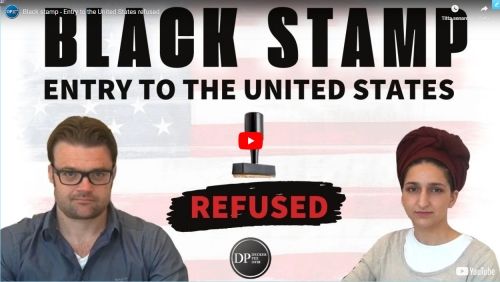What is an Immigration Spouse Visa?
An Immigration Spouse Visa to the United States, also known as a Marriage-based Visa, allows a foreign national who is married to a US citizen or a legal permanent resident (commonly known as “Green Card” holder) to enter and live in the United States as an immigrant with no strict time limits. This type of visa is granted to individuals who intend to permanently immigrate and relocate the US. This visa category is designed to reunite married couples who are living apart due to immigration restrictions. After their entry to the US, the spouse will be issued with a Green Card, since the visa is only a temporary document.
There are two primary types of Immigration Spouse Visas which this article outlines: CR-1 Visa (“CR” stands for “Conditional Resident”) and IR-1 Visa (“IR” stands for “Immediate Relative”). The CR-1 and IR-1 visas are both part of the family-based immigration category, which allows US citizens or Green Card holders to sponsor their immediate relatives for immigration.
What are the differences between the CR-1 and IR-1 Immigration Spouse Visas?
The main distinction between CR-1 and IR-1 visas is the length of the marriage at the time of application: while the CR-1 Visa is aimed at spouses of US citizens who have been married for less than two years at the time of the visa application, the IR-1 Visa is intended for couples who have been married for more than two years at the time of the visa application.
Other differences between the CR-1 and IR-1 Immigration Spouse Visas can be found in the specifics regarding the length as well as the renewal process of the Green Card obtained following the approval of these visas by the US Citizenship and Immigration Services (USCIS):
- CR-1 Visa
When a foreign spouse enters the US on a CR-1 visa, they receive conditional permanent resident status, which is valid for 2 years. Within the 90 day period before the expiry date of the CR-1 Visa (after two years have passed), the foreign spouse and the American spouse must jointly file an application to remove the conditional status and receive a new Green Card, which will be valid for a period of 10 years – the normal period of validity for Green Cards.
- IR-1 Visa
Unlike the CR-1 visa, the IR-1 visa leads to the issuance of a regular Green Card, valid for 10 years – without any conditions.
What are the specific requirements when applying for an IR-1 or CR-1 Immigration Spouse Visa?
- The sponsor of the request must be a US citizen or a green card holder, and should complete an immigrant petition on behalf of his/her spouse, filling out Form I-30, Petition for Alien Relative. In regard to this process, the sponsor will generally be called the referred to as the “Petitioner,” while the foreign spouse is known as the “Beneficiary.”
- The Petitioner must be at least 18 years old.
- The couple must be able to show that their marriage is lawful and be able to provide a valid marriage certificate.
- The marriage must be authentic: the couple must be able to prove that their marriage is not a sham/fake marriage by showing evidence to prove the relationship is genuine. Examples of these types of documents include shared financial responsibilities, documents that demonstrate the couple lives/has lived together, photographs and other documents that can prove their joint vacations, communication records (such as emails, chat logs, or phone records) and affidavits from witnesses, such as family members and friends, regarding the true status of their relationship.
- The sponsoring spouse (Petitioner) must file an Affidavit of Support (Form I-864), demonstrating that he/she has sufficient financial resources to financially support their foreign spouse (Beneficiary), and prevent them from becoming a public charge. This form is a legally binding contract in which the sponsor agrees to financially support the Beneficiary and any other sponsored family members, if necessary, and that they are not likely to rely on the US government for financial support. The Petitioner’s income should meet the minimum income requirements established by the USCIS to demonstrate the ability to financially support any Beneficiary. According to the USCIS current requirements, they must have the means to support their household at 125% of the federal poverty level in US based income. If the Petitioner’s income does not meet this standard, they may need to provide additional evidence of assets or file with a joint sponsor who meets the income requirements.
- The Petitioner must have US domicile, meaning they must provide evidence for having established a permanent home in the US with intention to maintain that residence for the foreseeable future. If they live outside the US, they must prove they plan to return to live in the United States together with the Beneficiary and any ties they hold to the US.
How does one apply for an Immigration Spouse Visa?
After applying for a Form I-130 petition and USCIS approving the application, the case will be forwarded to the NVC (National Visa Center) and then to the US Embassy or Consulate abroad, where the Beneficiary resides. This process is called “Consular Processing”, which is a process in which foreign nationals who are outside the United States apply for an immigrant visa at a US Consulate or Embassy in their home country. Consular Processing is often used for family-sponsored immigration, employment-based immigration, and certain other categories of immigrant visas. It is important to note that Consular Processing might be a complex and time consuming process, with varying processing times depending on the country and the specific circumstances of the case.
What happens during Consular Processing?
During Consular Processing the foreign spouse will need to complete various forms and provide supporting documents. Moreover, they will need to undergo a medical examination and attend a visa interview at the US Embassy or Consulate in their home country.
- Medical examination, vaccines and fingerprinting: Before the consular interview, the intending immigrant is required to undergo a medical examination by an approved physician to ensure the health requirements are met, including required vaccinations by the US. In addition, fingerprints of the intended immigrant will be taken.
- Visa interview: At the visa interview, the foreign spouse will be questioned by a consular officer who will assess the authenticity of the relationship and determine if the foreign spouse is eligible for the visa. The officer may review their documentation, and ask questions about the relationship, background, and intentions in the United States. This officer will determine their eligibility for an immigrant visa.
What might cause an applicant to be ineligible for an Immigration Spouse Visa?
There are certain acts that may lead to the rejection of the IR-1 or CR-1 Visa application. E.g.: drug trafficking, overstaying a previous visa or submitting fraudulent documents. If that is the case for you, the consular officer in the relevant consulate or embassy will inform you about it, and will advise whether there is a waiver of the ineligibility available to you and if so – what the waiver process is.
What happens once the Immigration Spouse Visa (CR-1 or IR-1) is approved?
If the Immigration Spouse Visa application is approved by the US Embassy or Consulate, the foreign spouse will get back their passport, which will contain the IR-1 or CR-1 Immigration Spouse Visa, together with the documents they provided the consular officer with during Consular Processing. These documents will be given to the foreign spouse in a separate sealed packet. It is important not to open this sealed packet, since it is aimed for the US immigration official to open upon arrival of the foreign spouse to the the United States. After arriving to the US, the foreign spouse immediately becomes a legal permanent resident (green card holder), and the Immigration Spouse Visa will serve as evidence of their legal permanent resident status temporarily, until they receive the green card. The actual green card will be mailed to their US address 1-2 months upon their arrival to the country.
Please keep in mind that after receiving the Immigration Spouse Visa, and before the foreign spouse can travel to the United States, he/she must also pay the USCIS Immigrant Fee, and the USCIS will not issue them a Green Card until they have paid this fee. Once the Immigrant Fee is paid, the green card will be mailed to the US address as mentioned above.
What can one do if the petition for Immigration Spouse Visa is denied?
If a petition for an Immigration Spouse Visa is denied, the Consular officer will provide you with a letter on why you have been denied, and it is important to consult with a specialized immigration attorney who will be able to get more details and help you deal with the situation. Generally, the reason for a denial is missing certain documents. Once these documents have been provided to the Embassy, the consular officer is likely to approve the application. As a result of the ever changing landscape of the United States immigration regulation, your ability to gain permanent residency is not assured. In cases where you have been denied due to criminal background, fraud and similar complex issues, it is important to let an expert in the field of immigration law to see what can be done – including appealing the decision or submit a new application with the necessary revisions.
Can a married couple ask for CR-1 or IR-1 Immigration Spouse Visas if the foreign spouse (Beneficiary) is already living in the USA?
If the foreign spouse is already residing in the United States, they would generally apply for Adjustment of Status instead of filing an immigrant visa petition. Adjustment of Status allows eligible individuals who are already present in the United States to apply for a Green Card, without having to leave the country. To apply for Adjustment of Status based on a spousal relationship, the spouse who is a US citizen will need to file Form I-130, Petition for Alien Relative, on behalf of the foreign spouse, along with Form I-485, Application to Register Permanent Residence or Adjust Status.

How long does will it take to get an IR-1 or CR-1 Immigration Spouse Visas from US authorities?
The processing time for IR-1 or CR-1 Immigration Spouse Visas from US authorities can vary depending on several factors. These factors include the workload of the specific USCIS office, the completeness of the application (whether all the required documents were presented properly with no need for additions or amendments) and the individual circumstances of the case. However, in general, if the Petitioner is a US citizen, the waiting time is expected to be around 2 years from start to finish. If the Petitioner is not a US citizen, but a Green Card holder, the waiting time is likely to be longer. Engaging the services of an immigration attorney can help ensure that your application is prepared correctly and may help expedite the process.
What can an engaged couple do in order to get a US visa?
If a couple is engaged and not yet married, there is a specific visa category available for them to consider: the K-1 Nonimmigrant Visa for a Fiancé(e). This visa type allows a foreign fiancé(e) of a US citizen to enter the country for the purpose of getting married within 90 days of arrival . After the marriage takes place, the US citizen spouse can then apply for the above mentioned Adjustment of Status – in order for their foreign citizen spouse to become a Green Card holder. If the couple decides not to get married or fails to marry within 90 days, the foreign fiancé(e) would typically be required to leave the United States.
How to apply for a 10-year Green Card after receiving a CR-1 Immigration Spouse Visa?
If you received a CR-1 Visa, and want to remove the condition from your conditional Green Card, in order to receive a 10 year green card – you may apply (jointly, with your spouse) for Removing Conditions on Permanent Residence Based on Marriage by filing a form I-751. In this application you must explain again that your marriage is authentic and not just for immigration benefits. You will also need to show that you are still married to the same US citizen or lawful permanent resident after two years. This evidence could include documents such as statements from a joint bank account, birth certificates for children born during that period, or property deeds with both names listed. There is a process also for couples who have divorced in the meantime.
How does one renew a Green Card or apply for Citizenship after getting an IR-1 Visa?
If you have received an IR-1 visa, you will then receive a Green Card which requires renewal after 10 years by filing Form I-90: Application to Replace Permanent Resident Card. You will need to complete your form, submit a copy of your Green Card, and pay the fee. You can either file this form online or by mail.
Another option, which has many benefits, is to apply for US Citizenship. If your spouse is a US citizen, you can apply after three years, otherwise you will have to wait for five years.
Start your Immigration Spouse Visa application by contacting a lawyer with expertise and experience
Immigration laws in the United States can be complex and subject to frequent changes. Therefore, an experienced lawyer specializing in US immigration laws can help you understand the intricacies of the immigration process, including eligibility requirements, documentation, and potential challenges or pitfalls. Decker, Pex, Levi, a reputable law firm with branches in Jerusalem and Tel Aviv, specializes in US immigration laws and has a dedicated US immigration team to assist you with your IR-1 or CR-1 Immigration Spouse Visa application. We will be happy to be at your service and assist you in everything related to the issue. You are more than welcome to contact us using the phone number or email address listed below.
The article was written in collaboration with attorney Adam Jonsson.













